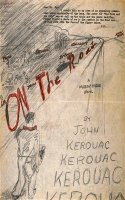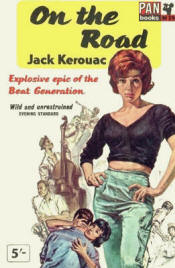|
General
Rachel
Adams.
Hipsters and jipitecas : Literary
Countercultures on Both Sides of the Border.
American Literary History; Volume 16,
Number 1, Spring 2004, pp. 58-84.
Richard
Brookhiser.
The Beats Now. National Review;
Vol. 49, May 1997, Issue 9, p54.
Mary Patricia
Carden.
'Adventures in auto-eroticism': economies of
travelling masculinity in autobiographical
texts by Jack Kerouac and Neal Cassady.
Journeys, June 2006 v7 i1 p1(25).
Jonathan Paul
Eburne.
Trafficking in the Void: Burroughs, Kerouac,
and the Consumption of Otherness.
Modern Fiction Studies; Volume 43,
Number 1, Spring 1997, p. 53.
Oliver
Harris.
Cold War Correspondents: Ginsberg. Kerouac,
Cassady, and the Political Economy of Beat
Letters. Twentieth Century
Literature; Summer2000, Vol. 46 Issue 2,
p171.
Robert Genter.
"I'm Not His Father": Lionel Trilling, Allen
Ginsberg, and the Contours of Literary
Modernism. College Literature;
31.2, Spring 2004, pp. 22-52.
 Allan
Johnston.
Consumption, Addiction, Vision, Energy:
Political Economies and Utopian Visions in
the Writings of the Beat Generation.
College Literature; 32.2, Spring 2005,
pp. 103-126. Allan
Johnston.
Consumption, Addiction, Vision, Energy:
Political Economies and Utopian Visions in
the Writings of the Beat Generation.
College Literature; 32.2, Spring 2005,
pp. 103-126.
Roger
Kimball.
A Gospel of Emancipation. New
Criterion; Oct97, Vol. 16, Issue 2, p4.
Matt Theado.
Beat Generation Literary Criticism.
Contemporary Literature; Volume 45,
Number 4, Winter 2004, p747.
Lorenzo
Thomas. 'Communicating
by horns': Jazz and redemption in the poetry
of the Beats and the Black Arts.
African American Review, Vol. 26, No. 2,
Poetry and Theatre Issue (Summer, 1992), pp.
291-298.
Allen Ginsberg
Ben Lee.
Howl and Other Poems : Is There Old Left in
These New Beats? American Literature;
Volume 76, Number 2, June 2004, pp. 367-389.
Justin
Quinn.
Coteries, Landscape and the Sublime in Allen
Ginsberg. Journal of Modern
Literature. Volume 27, Number 1/2, Fall
2003, p. 193.
Tony Trigilio.
"Strange Prophecies Anew": Rethinking the
Politics of Matter and Spirit in Ginsberg's
Kaddish. American Literature;
Volume 71, Number 4, December 1999, pp.
773-795.
Jack
Kerouac
Jack Kerouac
-
A Brief Biography
Marco Abel.
Speeding Across the Rhizome: Deleuze Meets
Kerouac On the Road. Modern Fiction
Studies; Volume 48, Number 2, Summer
2002, p227.
James
Campbell.
Kerouac's Blues. Antioch Review;
Summer99, Vol. 57 Issue 3, p363.
Clark
Coolidge.
Kerouac. American Poetry Review;
Jan/Feb95, Vol. 24, Issue 1, p. 43.
Tim Cresswell.
Mobility as Resistance: A Geographical
Reading of Kerouac's 'On the Road.' Transactions
of the Institute of British Geographers.
Vol. 18, No. 2 (1993), pp. 249-262.
George
Dardess.
The Delicate Dynamics of Friendship: A
Reconsideration of Kerouac's On The Road.
American Literature, Vol. 46, No. 2.
(May, 1974), pp. 200-206.
Ann Douglas.
`Telepathic
Shock and Meaning Excitement': Kerouac's
Poetics of Intimacy. College
Literature, Winter2000 Special Issue,
Vol. 27 Issue 1, p8.
Malcom Douglas.
"Jazz America": Jazz and African American
Culture in Jack Kerouac's On the Road.
Contemporary Literature, Spring 1999
v40 i1 p85.
|
Craig
Frischkorn. Jack
Kerouac comes home to Lowell. American
Theatre v11.n6 (July-August 1994): pp72.
Nancy
McCampbell Grace.
A White Man in Love:
A Study of Race, Gender, Class, and
Ethnicity in Jack Kerouac's Maggie.
College Literature, Winter2000 Special
Issue, Vol. 27 Issue 1, p8.
Sarah
Haynes.
An Exploration of Jack
Kerouac's Buddhism: Text
and Life. Contemporary
Buddhism; Nov2005, Vol. 6 Issue 2,
p153-171.
Robert
Holton.
Kerouac Among the Fellahin: On the Road to
the Postmodern. Modern Fiction
Studies; Summer95, Vol. 41, Issue 2,
p265.
Tim Hunt.
The Misreading of Kerouac, The Review
of Contemporary Fiction, Vol. III, No.
2, Summer, 1983, pp. 29-33.
Ronna C.
Johnson.
'You're
putting me on': Jack
Kerouac
and the Postmodern Emergence.
College Literature, Winter2000 Special
Issue, Vol. 27 Issue 1, p8.
Corey
Kilgannon.
Off the Road And the Wagon, Kerouac Found
Refuge on L.I.. New York Times,
December 31, 2006, p21.
Joseph
Lelyveld.
Jack Kerouac, Novelist, Dead; Author of 'On
the Road.'
New
York Times, October 22, 1969. p47.
Ralph
Lombreglia.
The Only People for Him. Atlantic
Monthly; Aug1996, Vol. 278, Issue 2,
p88.
Carl D.
Malmgren,
On the Road Reconsidered: Kerouac and the
Modernist Tradition. Ball State
University Forum, Vol. 30, No. 1,
winter, 1989, pp. 59-67.
Erik R.
Mortenson.
Beating Time: Configurations of
Temporality in Jack
Kerouac's
On the Road. College
Literature; Fall 2001, Vol. 28 Issue 3,
p51.
Brendon
Nicholls.
The Melting Pot That Boiled Over:Racial
Fetishism and the Lingua Franca of
Jack Kerouac's Fiction. Modern
Fiction Studies 49.3 (2003) 524-549.
Mark
Richardson.
Peasant Dreams: Reading On the Road.
Texas Studies in Literature and Language;
Volume 43, Number 2, Summer 2001, pp. 218
Steven W.
Roberts.
San Francisco's North Beach, the Many
Different Worlds and Generations Never Meet
New York Times, Nov 4, 1969. p32.
Simon Rycroft.
Changing Lanes: Textuality off and on the
Road. Transactions of the Institute
of British Geographers, New Series,
Vol. 21, No. 2 (1996), pp. 425-428.
Andrew
Sarris.
More Babbitt than Beatnik. New York
Times, February 26, 1967. p.BR3.
David
Sterritt. Kerouac, Artaud, and the Baroque
period of The Three Stooges. Mosaic,
Dec 1998 v31 i4 p83(1). Mosaic,
Dec 1998 v31 i4 p83(1).
Regina
Weinreich.
The Sound of Despair: A Perfected
Nonlinearity. The Spontaneous Poetics
of Jack Kerouac: A Study of the Fiction,
Southern Illinois University Press, 1987,
pp. 89-118.
Steve Wilson.
"Buddha Writing": The Author and the Search
for Authenticity in Jack Kerouac's On the
Road and The Subterraneans. The
Midwest Quarterly, Spring 1999 v40 i3
p302(1).
|